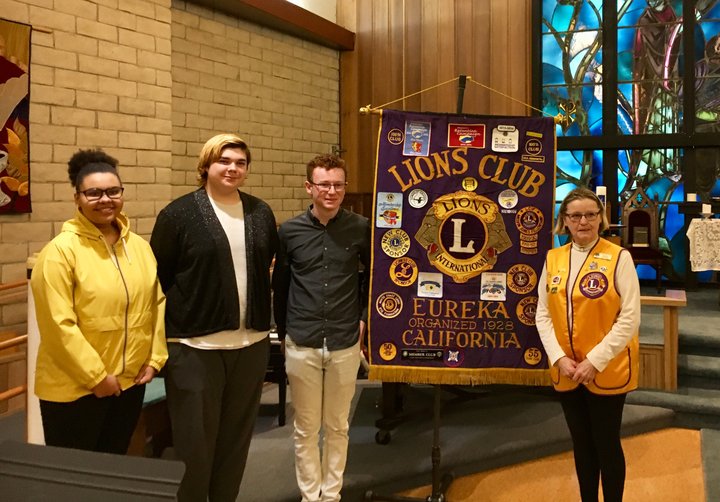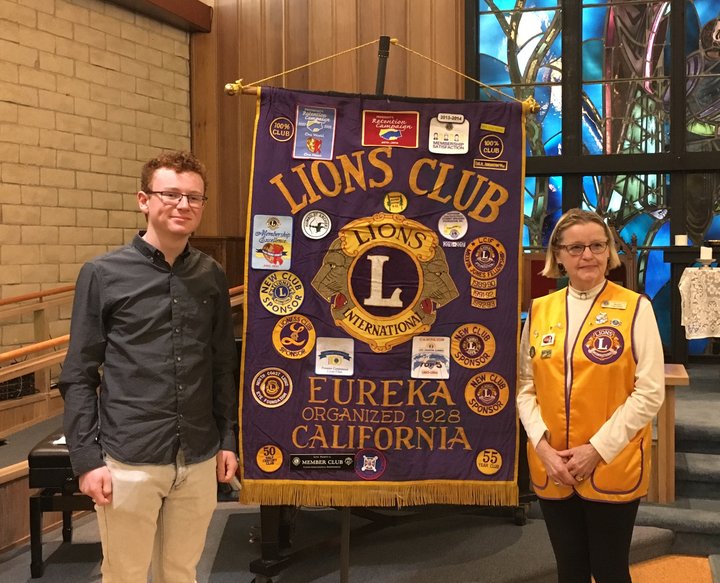
Students Samahri Brice, Adain Driscoll and Ari Alter with Michele Fell-Casale
Three local high school students dialectically expressed their stances on how to best address the homeless crisis that is facing California in a speech in front of the Eureka chapter of the Lions Club today at the United Congregational Christian Church of Eureka.
It was the 83rd annual event for the Student Speakers Contest which asked the student speakers to answer the question of: “Homelessness in California; what is the solution?” The speakers had between five and ten minutes to lay out their solutions in a speech to about 20 attendees.
“For this level of speaking, they can use whatever they want for notes,” said Jerry Carter, a 10-year member of the Lions Club. “There is no limitations on how they give their speech.”
The Lions Club in Eureka was founded in 1928 as a community service organization. This event allows them to further the educational aspirations of the students in the community and to allow a younger generation to think about some of the more important topics of our day. The student speaking contests here in California extend as far back as 1937 when a young man named Benjamin Hoover from Modesto won the event on the topic of “Americanism.”
“The topics are selected to challenge students, but to also be relevant,” Michele Fell-Casale, a Lions Club member, told the audience. She then turned to the student speakers and said, “This is hard to do. One of the scariest things there is to do is to get up and say a few words in front of people.”
The first speaker to address the audience was Samahri Brice. Brice attends Alder Grove Charter School and focused her speech on the income inequality plaguing Californians. She talked about the problems of everyday people living paycheck to paycheck and how the minimum wage is too low — especially for workers in the service industry, such as Walmart employees.
She gave examples of how much a minimum worker gets paid and compared them to the average rent costs, pointing at the shortfalls.
“Saving is not realistic in these situations,” Brice said.
She also talked about the shortcomings in housing the chronically homeless and suggested a Housing First strategy. She pointed to the success of tiny home villages in Eugene, Oregon and how some homeless community members in Los Angeles get paid $15 an hour to help clean up the streets of Skid Row. She also pointed to the need to change public thinking when it comes to addressing these issues.
“People should not be judged on what got them in their situations,” she said.
She finished by pointing out how homelessness has not been given a high enough priority by saying, “If we don’t fix it, it will overcome us.”
The next speaker to take the stand was Ari Alter. Alter is a sophomore at the Northcoast Preparatory Academy in Arcata. Alter’s speech focused on income inequality and the myriad factors for why people may end up homeless such as mental health and physical illness.
“We are seeing people who are working full-time make the decision between rent and food,” Alter said.
The bulk of his speech shifted to the need for housing. He pointed to tiny home villages as a solution to “get people on their feet.” To help inform his speech he said he interviewed Nezzie Wade, one of the founders of Affordable Homeless Housing Alternatives (AHHA). Wade told him a major roadblock to enacting housing solutions is Article 34 of the California Constitution. Article 34 restricts local governments from building any low-rent housing unless it is approved by a majority of voters. (Read more about Article 34 and its roots in Humboldt County here).

AHHA’s shower trailer
Alter also highlighted AHHA’s shower trailer and its ability to give those who are experiencing homelessness the ability to focus on hygiene and a way for them to clean up before trying to pursue a potential job opportunity. Alter finished off his speech by saying that we as a community need to do more to help those in need.
“We must donate time and/or money to help the less fortunate,” he said.
The last speaker to address the audience was Adain Driscoll. Driscoll attends Six Rivers Charter High School and it is his second year speaking at the Lions Club event. He talked about his own personal experience of interacting with friends who are homeless or housing insecure.
“People being homeless affects everyone,” Driscoll said.
The majority of Driscoll’s speech talked about the shifting economies here in Humboldt and attributed the increase in homelessness to the loss of the logging industry and the legalization of marijuana. He said the shifting of revenue in the cannabis industry, from untaxed profits to taxed profits, had been an unsettling jolt to some of the people involved.
“This change can send a lot of people spiraling downhill if they don’t adapt fast enough,” Driscoll said.
As a solution, Driscoll pointed to the need to grow the local economy here in Humboldt. He spoke about how Humboldt has a very insular economy and how if we “raise more small businesses,” we can help the people most affected here at home.
Driscoll also finished off his speech with a call for action. He said we should focus more on the children in foster care and called for the people who are willing and able to do so take the children in.
“You will be housing kids who are homeless or in dangerous situations,” Driscoll said. “Give the person a chance, sometimes all it takes is to give someone something to lean on.”
Three volunteer judges scored the students on three areas: the text of the speech, their delivery and the overall effectiveness and effort. The judges chose Ari Alter as the winner of the event. Alter told the Outpost that he wrote the majority of his speech at Mosgos coffee shop in Arcata and spent about a total of six hours preparing it for today’s event.

Ari Alter and Michele Fell-Casale after winning the speech competition
“I really like public speaking and current events,” he said. “It is important to dive deeper into these topics like homelessness.”
As the winner of the event, Alter received a $100 prize and will go on to the next level to compete against students at the Zone level. He will be competing against students who won their club level events at the Trinidad and McKinleyville Lions Clubs. The competition will on March 14 at the Christ Episcopal Church in Eureka, where the winner will take home $150 and advance on to the regional contest.
Michele Fell-Casale finished off the event by congratulating the students and giving the two runner-ups a prize of $25 and a plaque. She finished the event by addressing the students, “The tools you are learning right now, will help in the future in whatever career you may choose.”
CLICK TO MANAGE